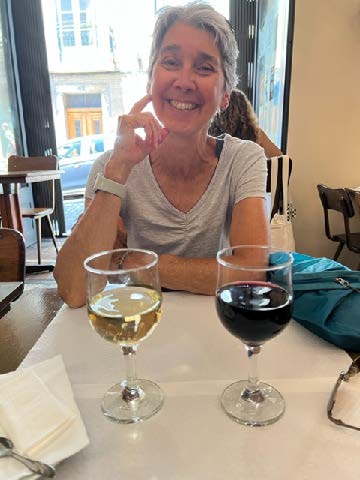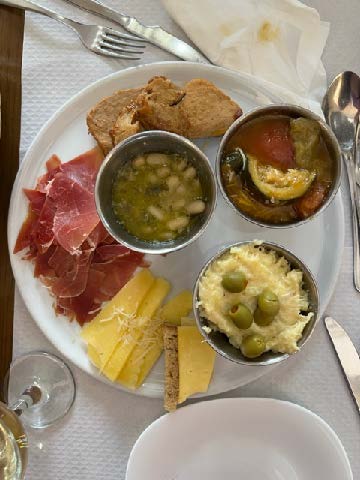Tuesday was our second full day in Lisbon. We enjoyed another world-class breakfast at the Myriad by Sana hotel, and were out the door by 09:00. We walked 0.6 miles to the Moscavide Metro station on the Red Line, got through the turnstiles with yesterday’s 24-hour tickets, and headed south on the Red Line to the Alameda station. A quick transfer a level up to the Green Line, and we were on our way to the Baixo-Chaido station. From there it was a 1/2-mile walk to our appointment for a private tour of the city on pedal e-bikes.
We spend a lot of time on bikes — a lot. We have a dozen bikes of all sorts, including e-bikes. We have ridden countless century (100 mile) rides, and toured most of the civilized (and uncivilized world) by bike — all over the U.S., every country in Western Europe, most countries in Eastern Europe, North Africa, and South America. I mention all this so I have credibility in saying I do not recommend riding a bike of any sort in Lisbon. The streets around rough cobblestone and narrow. The hills are very steep. The traffic intense. The deference allowed by cars, minimal. Both cars and bikes go 1 meter and stop, 1 meter and stop, 1 meter and stop. On very steep hills, up and down, that is no way to bike. To be clear, we love Lisbon. It’s just not a place to ride a bike.
Hot and sweaty after our bike ride, we found an off-the-path tapas bar to calm our nerves, rest, and rehydrate. Our intention was just a glass of wine and a bottle of chilled water. Julie ordered a glass of house red wine and I, a glass of house vinyho verde. When I ordered by glass, the proprietor smiled broadly. Vinho verde is a Portuguese delicacy. It literally translates as “green wine,” which speaks to both the type and age. It is light, white, and tart. I highly recommend it. It is also possible to get vinho verde in knowledgeable and enlightened U.S. wine shops. The photo is us, hot and sweaty, with our wine.
The proprietor brought our wine, and two small cups of soup we did not order. He explained that he made the soup himself, and we looked like we could use something nourishing. It was a flavorful cream purée of potato and zucchini. Wow! Based on the sample of soup, we asked what else he made. He smiled and talked about his tapas. We asked him to choose a selection for us. The next photo is his selection of tapas — Portuguese cheese at the bottom of the plate, cured ham working clockwise from the cheese, hunks of roasted pork, stewed vegetables, cod with cheese and olives, and stewed garbanzo beans in the cup in the middle. All wonderful.
We complimented him and he spent time chatting with us. He knew only a little English, and I know only a little Portuguese. Still, with lots of gestures, simples sketches on napkins, laughter, and wine, it was a pleasant way to spend the afternoon.
A few hours later and after a few more miles of walking and talking with locals, we boarded the Metro and headed back toward out hotel, but not quite to our hotel. The next day, we were scheduled to take a train (not the Metro) from Lisbon to Madrid starting at the Orient train station in Lisbon. Not having a clue how to do that, we exited the Metro at the Orient train station to learn the system. And good it was that we did.
After learning the secrets of the Orient train station, we walked the mile between it and our hotel. Showers, and then we dressed for dinner. I always take a simple, black sport coat on my travels. Julie always takes a simple but elegant long dress. Dressed that way, the treatment we get compared to what other tourists in shorts and t-shirts get is significant. We were escorted to a very private table outside on a balcony overlooking the water.
During and after ordering, we engaged our waiter in small talk. We told him how much we had enjoyed our short time in Portugal, talked about the beauty of the country and the friendliness of the people, and the historical role Portugal has played on the world stage. He beamed. As we ate, more of the staff stopped to talk, including the maitre’d, the chef, and the general manager. We talked about cooking styles, culture, history, politics, economics, and people. Next we knew, the general manager had produced an elegant tray of desserts, several bottles of Port, an array of glasses, and a chair to join us. In the blink of an eye, it was midnight.
Why is this important? A old friend told me before we started this trip that he does not travel. It caused me to ask myself why I travel. I have come to realize it is for three reasons:
First, history, culture, geography, macro and micro economics, religion, language, habits and practices, and motivations are important for us to understand because they shape all that we do. We can hope to learn these things from books and teachers, or we can travel and experience.
Second, you can learn how to perform a basketball jump shot by reading a book, but you don’t really know how to make a jump shot until you are on the court, people yelling and screaming, a defender in your face, and the game on the line. Some people play video games or assemble jig saw puzzles to keep their minds sharp. I enjoy figuring out how to travel in foreign lands. Both challenge the mind. However, getting on the wrong train has real consequence, which increases the stakes and makes the “game” real.
Third, I think it is our responsibility to travel. As we finished dinner and rose to retire to our room, the staff huddled around the general manager. We heard them ask, “Who were those people?” because it was unusual for the general manager to spend the better part of an evening talking with one table of guests. We overheard the GM say, “Those were Americans. No other people in the world are as interested in other people, or as kind as Americans.” I have heard that countless times during my travels. And that is part of why we travel. We can do, naturally and credibly, as we travel, what governments and diplomats cannot. Every day, as I travel, I go out of my way to be kind to people. Last night, Julie and I asked the lady at the front desk of our hotel where she recommended we go for dinner. She told us. We went. It was spectacular. Walking back after dinner, we stopped at a pastry shop and bought a couple pieces of baklava for her. I presented them to her in a nice gift box. As I walked away, he colleague asked, “Who are those people.” “Those are Americans,” she said.


